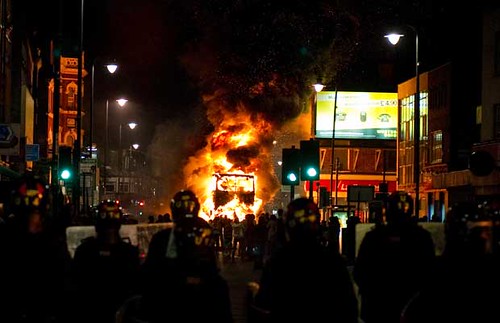
Black and working class youth confront cops in various areas of London and its suburbs for two straight nights. The rebellion was sparked by the police killing of Mark Duggan in Tottenham., a photo by Pan-African News Wire File Photos on Flickr.
Analysts search for trigger of UK violence
Meredith Griffiths
Updated August 09, 2011 15:10:39
Australia Broadcasting Corporation
Many commentators are asking why the riots spread beyond the initial flashpoint of Tottenham.
The rapid and dramatic eruption of violent rioting in London has stunned social commentators in Britain.
Many are blaming the UK government's austerity measures, while others say it is being driven by underlying racial tensions and poverty.
The acting head of the London police, Tim Godwin, says he is seeing gratuitous violence and deputy prime minister Nick Clegg says rioters are opportunistic thieves.
But Professor John Pitt, from the Vauxhall Centre for the Study of Crime, says that is too simplistic.
He told Al Jazeera's Stephen Cole that the police did not respond well to the initially peaceful protest about the shooting of a man in Tottenham.
"I think the issue of poverty and riots is slightly problematic, because I don't think it's quite as simple as poor kids banging their way into stores because they can't afford posh trainers," he said.
"I think there is a legacy going right the way back to 1985."
Professor Pitt says there has been a continuing tension between police and community in some parts of London since the large-scale urban riots in 1985.
"In Brixton, as in certain other parts of London, there is continuing kind of a somewhat volatile relationship, continuing tension, between police and the community," he said.
"And as we've seen in certain circumstances, people talk about a perfect storm of all sorts of things - certain circumstances - that blows up and it's blown up this weekend."
Many commentators are asking why the riots spread beyond the initial flashpoint of Tottenham.
The director of think tank The Institute of Community Cohesion, Mike Hardy, says the rioters beyond London are opportunistic, but he says that does not mean they do not have grievances.
"What we are seeing is a tremendous dislocation in British society between the haves and have nots and the ability of vulnerable communities to fracture ... for the slightest reason," he said.
Conspirators
Mr Hardy says these riots are different from those in past decades because people seem to be directing some of the rioters.
"I think there are conspirators; I think there are people who seek to take advantage. I think [there is] correspondence between trauma and instability and gangs and the criminal fraternity," he said.
"I think there were reports, however accurate, of people being signposted towards looting, of fires being spread to stretch the security services.
"If these are the case - and the reviews that will need to take place need to check this, need to bring evidence to bear - then this is a new dimension.
"And if there are forces influencing our young people in this way, then we need to take that very seriously."
Former mayor of London Ken Livingstone says the underlying reasons are economic and social.
"We've got to give young people an opportunity and hope," he said.
"You go into a college - half the students are certain they can afford to be there next year because of the educational maintenance [cost].
"You've got young men who have no prospect of a job, being able to provide for a wife and family. That's why, I mean, fearlessness - they don't care, they don't have a stake in society."
No comments:
Post a Comment